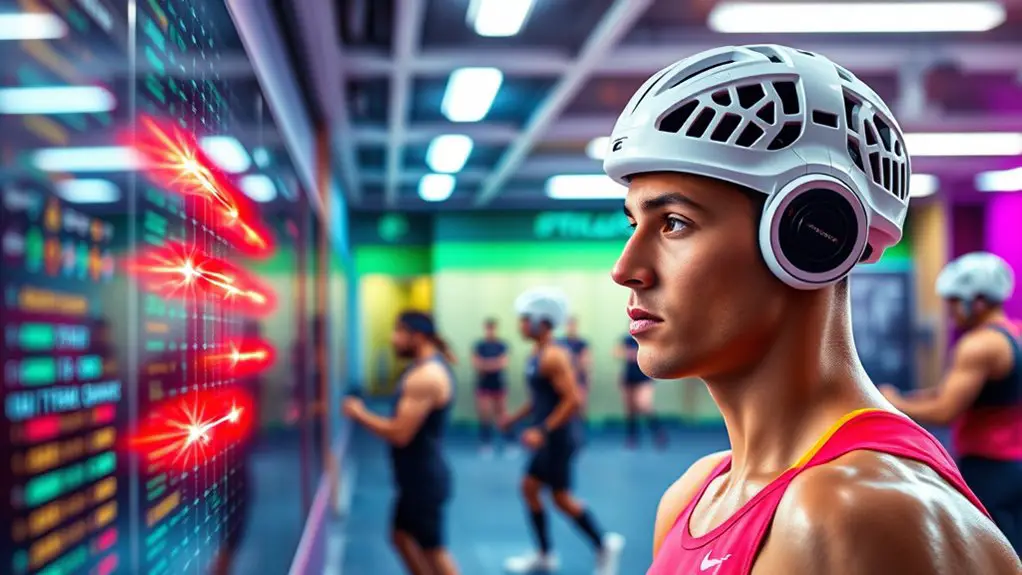Professional athletes use visualization techniques to enhance their performance by mentally rehearsing skills and refining their focus. You'll find them picturing flawless skills or imagining competition scenarios, which helps build confidence and reduce anxiety. This practice allows for emotional connection to success, improving muscle memory and decision-making under pressure. By adopting these methods, you can access your own potential and elevate your performance. There's more to discover about how these techniques can transform your approach.
The Science Behind Visualization in Sports
Although you might not realize it, visualization plays an essential role in enhancing athletic performance. It's not just about physical training; your mind's power can be a game-changer. When you visualize, you're actually creating neural pathways that mirror the actions you'll take in your sport. This means your brain can rehearse movements, helping to refine your skills without physical practice.
Studies show that athletes who incorporate visualization improve their focus, reduce anxiety, and enhance muscle memory. You can picture yourself achieving your goals, feeling the rush of victory and the joy of freedom that comes with it. Embracing this mental technique allows you to tap into your full potential, both on and off the field. So, why not give visualization a try?
Techniques Used by Elite Athletes
When elite athletes prepare for competition, they often rely on specific visualization techniques to enhance their performance. One powerful method is mental imagery, where you picture yourself executing skills flawlessly. This can boost your confidence and help you feel more at ease during competition. Another technique is setting vivid, detailed scenarios that simulate the actual event, allowing you to rehearse your strategy in a risk-free environment. You might also use affirmations to reinforce a positive mindset, repeating phrases that resonate with your goals. Breathing exercises combined with visualization can ground you, making it easier to focus. By incorporating these techniques, you can release your potential and embrace the freedom to perform at your best when it counts the most.
Visualization in Different Sports
Different sports utilize visualization techniques in unique ways, tailored to their specific demands and environments. In basketball, you might visualize perfect shots and seamless plays, honing your focus during high-pressure moments. Swimmers often imagine their strokes and turns, feeling the water's resistance as they mentally rehearse their races. For runners, visualizing the finish line can ignite that extra burst of energy when fatigue sets in. In team sports, like soccer, you could picture your positioning and interactions with teammates to enhance synergy. Even in individual sports like tennis, visualizing serves and returns can sharpen your game. Embracing these techniques lets you tap into your potential, giving you the freedom to perform at your best when it matters most.
Building Confidence Through Mental Imagery
Confidence is a crucial ingredient for success in sports, and mental imagery can be a powerful tool in building it. By visualizing your achievements, you create a mental blueprint that enhances your belief in your abilities. Picture yourself executing perfect plays, scoring goals, or crossing the finish line. This vivid imagery helps solidify your self-assurance and reinforces a sense of control over your performance. Each time you visualize success, you're training your mind to believe it's possible, which translates to real-world confidence. As you free yourself from doubt, you'll find that your skills shine brighter. Embrace this technique, and you'll cultivate a mindset that not only supports your athletic pursuits but also empowers you in life.
Enhancing Focus and Concentration
Building on the foundation of mental imagery, enhancing focus and concentration is essential for athletes looking to elevate their performance. When you visualize your goals, you're not just dreaming; you're honing your ability to concentrate on what truly matters. Picture yourself in the moment, fully engaged in your sport, blocking out distractions. This mental clarity allows you to channel your energy effectively, making split-second decisions with confidence. Incorporating short visualization exercises before practice or competition can sharpen your focus, helping you stay present. As you cultivate this skill, you'll find it easier to immerse yourself in the experience, releasing your true potential. Embrace visualization as a tool, and watch how your concentration transforms your game.
Reducing Anxiety and Stress
While it's natural to feel anxiety before a big competition, utilizing visualization techniques can considerably reduce that stress. Imagine yourself in a calm, focused state, where every move you make is fluid and confident. By visualizing your performance, you're not just rehearsing actions; you're training your mind to handle pressure. Picture the environment, the sounds, and the sensations—immersing yourself in the experience can help you feel more in control. This mental practice creates a sense of familiarity, allowing you to approach your event with confidence rather than fear. Embracing visualization can free you from the tight grip of anxiety, enabling you to perform at your best when it truly matters. So, close your eyes and see yourself succeed!
Success Stories: Athletes Who Swear by Visualization
Many athletes have found that visualization not only helps reduce anxiety but also plays a significant role in their journey to success. Here are a few inspiring examples of athletes who swear by this technique:
- Michael Phelps: The legendary swimmer visualized every race, from the starting block to the finish line, creating a mental video that helped him stay focused and calm.
- Serena Williams: She uses visualization to see herself winning matches, boosting her confidence and sharpening her competitive edge.
- Tom Brady: The NFL quarterback often imagines specific plays and outcomes, allowing him to mentally prepare for high-pressure situations.
These athletes show how powerful visualization can be, helping them break barriers and achieve their dreams.
Tips for Implementing Visualization Techniques
To effectively implement visualization techniques, it's essential to create a structured approach that works for you. Start by finding a quiet space where you can relax without distractions. Close your eyes and picture yourself performing your sport flawlessly. Focus on the details—how it feels, what you see, and the sounds around you. Make it as vivid as possible.
Set aside a few minutes daily to practice this technique, whether before a workout or competition. Combine visualization with deep breathing to enhance relaxation. Remember, it's about consistency; the more you visualize, the more natural it becomes. Don't be afraid to adjust your techniques as you discover what resonates with you. Embrace the freedom to explore different methods until you find your groove!
Frequently Asked Questions
How Long Does It Take to See Results From Visualization Techniques?
It usually takes a few weeks to notice results from visualization techniques. You'll find that consistency matters; the more you practice, the clearer your goals become, and you'll feel more empowered to achieve them.
Can Visualization Be Used for Non-Athletic Performance Improvement?
Visualization's not just for athletes; it can supercharge your focus, creativity, and confidence in any field. Imagine conquering challenges before they happen—it's like having a mental cheat code for life's obstacles!
Are There Any Risks Associated With Visualization Practices?
Yes, there can be risks with visualization practices. If you overly focus on specific outcomes, you might become anxious or discouraged when reality doesn't match your mental images, potentially hindering performance instead of enhancing it.
How Do I Know if Visualization Is Working for Me?
If you're feeling like a bird in a cage, it's time to check your progress. Notice changes in focus, confidence, and performance. Trust your instincts; if you're improving, visualization's definitely working for you.
What Are Common Misconceptions About Visualization in Sports?
You might think visualization's just daydreaming or that it guarantees success. It's not magic; it's a tool. It requires practice and commitment, and it won't replace hard work, but it can enhance your performance considerably.




